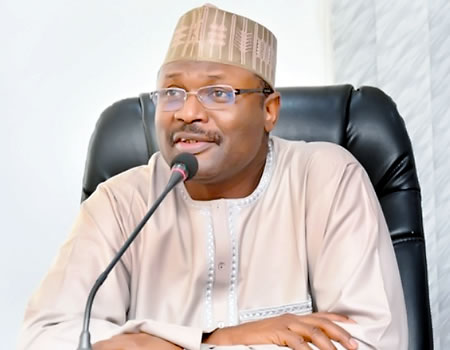
The Independent National Electoral Commission (INEC) has said while there are less court cases challenging the conduct of elections by the Commission, cases arising from the conduct of primaries for the nomination of candidates by political parties is on the increase.
The commission said “for instance, 30 elections were upturned by the Tribunals in 2019 as against over 100 in a previous election. Even so, in 23 out of 30 constituencies (i.e. 76%) the elections were only set aside in some polling units and not the wholesale nullification of elections in entire constituencies.
Speaking at the capacity building workshop for justices and judges on electoral matters, INEC chairman Prof Mahmood Yakubu noted that the commission has been joined in about 600 cases relating to the conduct of recent primaries and nomination of candidates by political parties for the 2023 general election.
The INEC chairman recalled that “one political party served about 70 Court processes on the commission in one day seeking to compel us to accept the nomination or substitution of its candidates long after the deadline provided in the Timetable and Schedule of Activities for the 2023 general election had elapsed.
He lamented that “some of the cases will go up to the Supreme Court”, adding that “the implication is that we are still dealing with issues of nomination of candidates thereby eating into vital time for preparation of and procurement of sensitive materials for the materials. It also means that the Courts will be dealing with the same issues long after the general election.
Prof Yakubu however stated that after studying the judgements of the tribunals arising from both the 2019 general election, the off-cycle governorship elections and the bye-elections conducted so far, the commission identified areas where it needed to do more to reduce litigations.
“We have studied the judgements of the Tribunals arising from both the 2019 General Election, the off-cycle Governorship elections and the bye-elections conducted so far. We identified areas where we need to do more to reduce litigations.
“As a result, we are witnessing increasingly less Court cases challenging the conduct of elections by the Commission.
“However, cases arising from the conduct of primaries for the nomination of candidates by political parties is on the increase.
“So far, we have been joined in about 600 cases relating to the conduct of recent primaries and nomination of candidates by political parties for the 2023 general election.
He reassured the judiciary that the Commission would continue to abide by Court orders, noting “however, strict adherence to stare decisis is critical for us as an election management body.”
On the provisions of the Electorate Act 2022, the INEC chairman said: “The new Electoral Act contains eighty new provisions intended to improve our elections and address some of the lacunae in the repealed Electoral Act 2010 (as amended), provide legal backing to the technological innovations introduced by the Commission overtime and the extension of timelines for the nomination of candidates and for other electoral activities.
“Similarly, the new Electoral Act confers exclusive jurisdiction to hear pre-election cases on the Federal High Court with regard to candidate nomination in order to reduce forum shopping by litigants, abuse of court process and reduction in the spate of conflicting judgements by courts of coordinate jurisdiction.
“We are reassured by the inspiring speech by My Lord the President of the Court of Appeal for the elaborate steps taken against conflicting judgement by Courts of coordinate jurisdiction.
“As a consequence of a similar workshop organised ahead of the 2019 General Election, we noticed a sharp reduction in the number of cases arising from that election and consequently a reduced number of elections nullified by the Election Petition Tribunals.”
